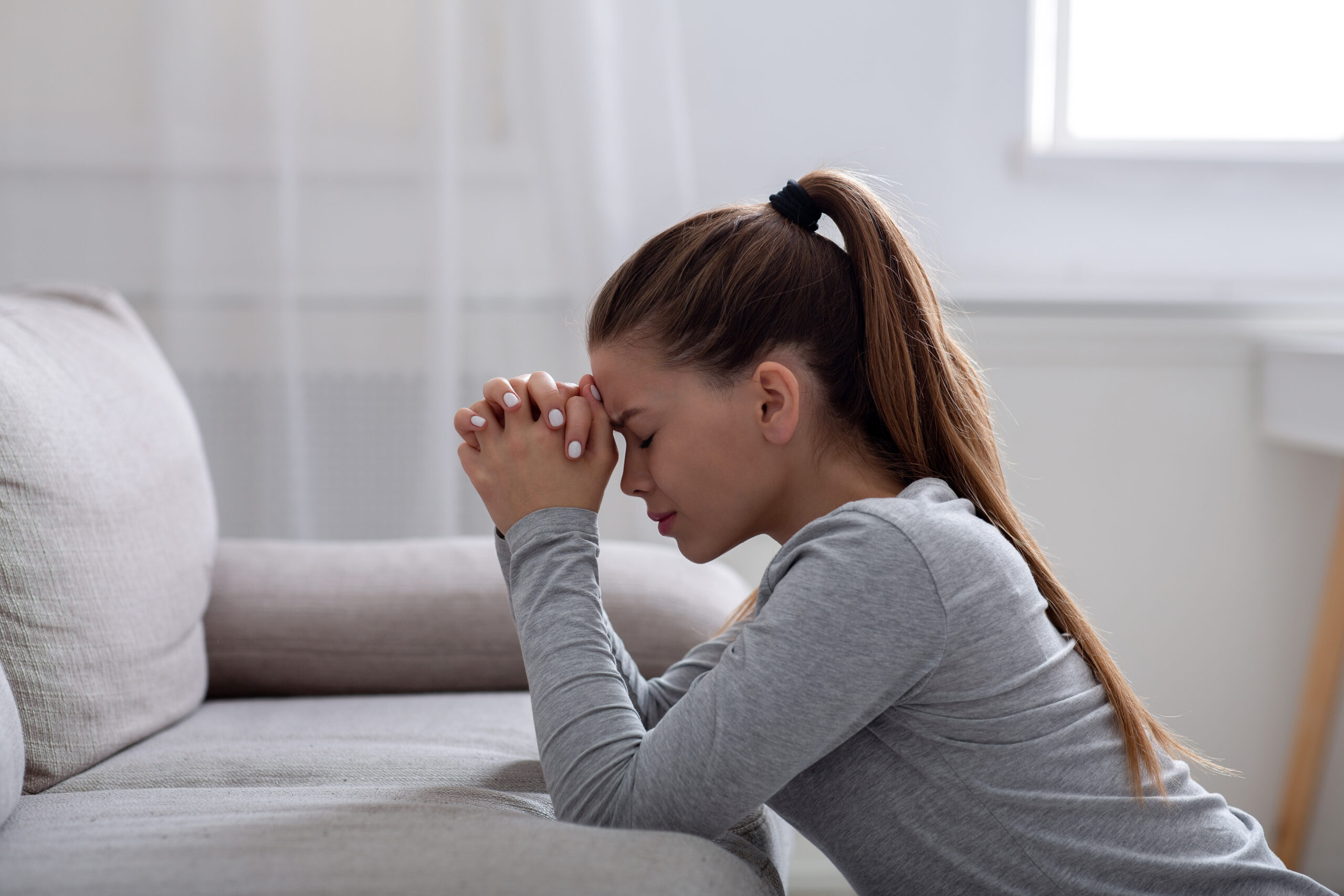Whether or not you have been diagnosed with an anxiety disorder, we all encounter anxiety from time to time. When anxiety rushes in, it’s hard to know how to handle it in the moment. Sometimes a small moment triggers a wave of anxiety that throws off your entire day.
Even though dealing with some levels of anxiety every once in a while is inevitable, that doesn’t mean you always have to suffer.
The good news is that there are some practices you can implement in your life that can help lower anxiety. Let’s look at a couple of them now so that you can live with more peace in your day to day life.
But first, let’s look at how anxiety affects us and why we want to find ways to lower it in our lives.
How Anxiety Impacts Our Bodies
Experiencing anxiety causes your amygdala, which are clusters of nuclei known as the “fear center” of the brain, to be overactive. The amygdala is always trying to assess if something is threatening you, and if it perceives a threat it initiates your body’s fight or flight response.
When you experience anxiety on a regular basis, your amygdala is always perceiving a threat, which keeps you in fight or flight mode longer and more often. This can take a toll on your mental wellbeing and cause serious anxiety or depression disorders.
Another thing that happens with anxiety is your adrenal gland becomes activated. Stay with me for a quick science lesson about the human body. Knowing how all of this works will help you learn how to combat anxious thoughts when they occur!
The amygdala decides that you are in fear and sends a message (via nerve impulses) to the hypothalamus, which is another part of your brain. The hypothalamus activates the pituitary gland, which activates the adrenal gland. So anxiety sets off a chain reaction of fear in your body.
The adrenal gland is your hormone control center. When it gets the fear message all the way from the amygdala, it releases adrenaline and cortisol.
That’s when you start to feel these anxiety symptoms:
- Your heartbeat speeds up
- Your breath quickens
- Your blood pressure goes up
- You feel flushed
- You have tunnel vision
Overall, your body is in a completely overwhelmed state. Experiencing these symptoms all the time can take a major toll on your quality of life, which is why we need to look at ways to lower anxiety and soothe ourselves when it happens.
Solution 1: Self-Care
Self-care is a major buzzword in the mental health space these days, but that’s because it’s so important. If we aren’t caring for ourselves, it’s easy to become overworked, exhausted, stressed out, and anxious, which means our body is sending that fear message all the time.
Self-care looks different for everyone, so you need to find what works best for you. Here are a few ideas:
1. Deep Breathing Exercises:
This one is so simple and only takes a few minutes. When you feel anxiousness setting in, try taking a deep breath to a count of four. Then hold it for a count of four and release it for another count of four. Continue this pattern until you feel your heartbeat slows down.
You don’t have to wait until you’re feeling anxious to try this. In fact, you should practice it when you’re at peace so that it becomes second nature and you remember it when you encounter anxiety. Try practicing it by laying down on your back and placing one hand on your chest and the other hand on your belly. When you breathe, you should feel your belly rise and fall. That’s how you know you’re breathing deeply into your diaphragm, which will help quell anxiety.
Try practicing this breathing exercise for a few minutes every day. Doing it in the morning will set a calm and relaxed tone for your day.
2. Pursue Something You’re Passionate About:
Oftentimes, adults don’t create enough space in their lives for fun and play. We bounce from one responsibility to the next and spend most of our time taking care of other people. Here’s a newsflash: self-care isn’t selfish. In fact, taking care of yourself will only benefit your relationships.
One great way to take care of yourself is to pursue something you’re passionate about just for fun. Have you always wanted to take a painting class? Do you love singing? Are you an avid bird watcher?
Take a few minutes to think about things that sound really fun to you and bring you joy. How many of those things are you actually pursuing in your life? It’s important to have hobbies that are just for fun with no strings attached.
Incorporating more fun and passion into your life will give you a break from the things that are making you anxious, and it will spark more creativity, which helps us to see the positives in life more.
3. Experience More Nature
Nature is an amazing place to connect with God and disconnect from everything else. It’s astounding how easy it is to live our lives completely indoors. Think about it, if you have an office job, you go from your home to your garage to your car to your office building, and then you work all day and go back to your car and your garage and your home. By the time you finally get home you’re exhausted, so experiencing nature is not at the top of your to do list.
The great thing about nature is that it’s often right at our fingertips. You don’t have to hike up a giant mountain to experience its magic (although that is a great thing to do if you’re into that). Simply stepping outdoors for a few minutes and breathing in some fresh air can help ground you in the present moment. Try to notice some trees and their creative intricacies. If you can, find a spot of grass where you can take your shoes off and feel the earth.
Simply notice all of the beauty around you. All of these quick encounters with nature will make you feel more grounded and connected with God, who is the giver of peace and joy.
If you can get out in nature for longer, like for a weekend hike or swim, that’s great. However, try to just incorporate these small moments in nature and see how it impacts your anxiety.
4. Create a Peaceful Home
If your home is cluttered and unorganized, it breeds stress and anxiety. Try taking control of your surroundings by decluttering your home and making it a place you truly love to spend time. Once it’s decluttered, you can have fun redecorating it in a way that brings you peace and joy. Your home should be your safe haven, not another cause of anxiety.
There are a couple of things you can do to create a more peaceful home environment. First, try dimming the lights when the sun goes down. This will help you rest better at night, which is important for your mental health. Hang art and pictures that bring you joy when you look at them. Create a restful corner where you can read and relax.
A few adjustments in your home can make it a place of peace, not stress. You will also feel so much lighter after you declutter and release things that are no longer serving you.
Solution 2: Prioritize Your Health
Did you know that our physical health and our emotions are connected? It sounds simple, but a healthy diet and regular exercise can have an amazing positive impact on your mental health.
1. Nourish Your Body with Healthy Food:
When it comes to food, everyone thrives on different types of diets. There’s no one size fits all solution. However, try to remember that food should be nourishing to your body. The more natural and nutrient-dense foods you eat, the more you’re protecting your body and your mental health.
2. Find Exercise That is Fun:
For too long, exercise has been used as a form of punishment. If you had a big indulgent dinner the night before, you punish yourself by going hard at the gym to erase the consequences. This punishment mentality just spurs more anxiety and bad relationships with both food and exercise.
Moving your body should bring more joy into your life. Think of it as a chance to have fun and express yourself instead of as a punishment for past crimes. Take a dance class, join a recreational basketball team, or start taking long walks with friends. Whatever you do, try to move your body in a way that makes you feel better, not worse.
3. Prioritize Sleep
Lack of sleep can send our bodies into overdrive, which quickly spikes anxiety and depression. It can easily put you in bad moods that are hard to get out of when you’re exhausted. It also makes it hard to remember things. On a physical level, lack of sleep raises your blood pressure, makes your blood sugar hard to regulate, and weakens your immune system.
Simply put, a chronic lack of sleep makes it hard for your physical body and mental health to thrive. Here are all the benefits of good quality sleep:
- Your memory is sharper
- You feel more positive emotions
- Your heart rate slows and your blood vessels can rest
- Your blood sugar is easier to regulate
- Your immune system is stronger
When you sleep well, you have more chances to thrive. However, it’s important to remember that when it comes to sleep, there’s a major difference in poor quality and good quality sleep. Good quality sleep is when you sleep soundly through the night and your body goes through a full REM cycle.
Here are a few ways you can get better quality sleep:
- Stop looking at screens at least an hour before bed
- Turn off the overhead lights and use lamps at night to signal your body that it’s almost time for sleep
- Sleep in a cool dark room
- Stick to a bedtime routine, like reading or doing your skincare before you get in bed
There are also a ton of benefits to taking afternoon naps. If you feel overwhelmed, they are a great way to give your body and brain a rest. When you wake up, you will feel refreshed and more equipped to face the thing that was overwhelming you before.
Note: shorter naps, around 30 minutes, will actually benefit you more than longer naps. Long naps can make you feel groggy and disoriented when you wake up, but short ones will leave you feeling rested and rejuvenated. Set an alarm so that you don’t nap for more than 45 minutes.
Solution 3: Drawing Closer to the Lord
Of course, we know that our true peace comes from our Heavenly Father. We can give him our worries, concerns, stresses, and anxieties at any moment.
When you are feeling anxiety rushing over you, draw closer to the Lord with these tools:
- Journal what you are feeling and release it to the Lord
- Say a quick prayer asking for help and guidance
- Read a scripture that talks about His promises
- Listen to worship music
- Sing a song to the Lord
- Meditate on His love and goodness
- Gather with friends to worship
Your Heavenly Father wants peace, love, and joy for you. He wants you to thrive. When you feel anxious or depressed, cast your worries on Him and let him surround you with His perfect peace.
Conclusion
Hopefully, you can find a few things from this list that really speak to you and will help ease your anxiety. The important thing is to be mindful of how you are feeling and not brush past or push away your emotions. When you feel your feelings, you can process them and release them.
If you are experiencing frequent anxiety, you should also consider speaking to a doctor and mental health professional. Therapy is a great place to process what you’re going through in a safe environment. Sharing with trusted friends and family members is also helpful.
I will leave you with a promise: “but those who hope in the LORD will renew their strength. They will soar on wings like eagles; they will run and not grow weary, they will walk and not be faint.” Isaiah 40:31
Author: Anna Harris







2 Responses
Thanks, I deal with stuff from the military and it was good to hear it from someone other than my Therapist. More good ideas to relax my mind from my past.
Michael, thank you so much for your comment. I’m sorry I overlooked it and am just now replying. I’m so so happy to hear that the article was helpful to you, particularly since you’re dealing with things from military experience. That’s encouraging to know that what we wrote was helpful! Thanks for sharing that! Anna